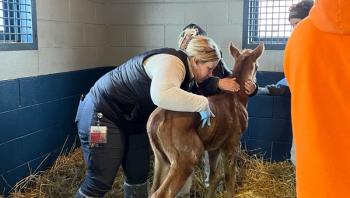
AVMA coverage: Executive board opens access to information
Schaumburg, Ill. - American Veterinary Medical Association leaders approved a Policy on Transparency during the Executive Board's fall meeting as well as a strategy for released AVMA-owned data.
Schaumburg, Ill. — American Veterinary Medical Association leaders approved a Policy on Transparency during the Executive Board's fall meeting as well as a strategy for released AVMA-owned data.
The actions are designed to enhance AVMA visibility and provide outside agencies with access to materials about the profession, specifically association members.
The Policy on Transparency states: "All approved AVMA professional policies (with pertinent background information) will be made available to all audiences. Other AVMA information may be available at the discretion of the executive vice president."
Board member Dr. John Scamahorn authored the policy's language, originally drafted by the Council on Communications and the Member Services Committee.
By contrast, the Policy on Release of Data, which also came from the same council and committee, upends a 1978 stance protecting raw economic data that officials consider outdated. The new policy allows AVMA-owned data to be released to individuals, nationally recognized research organizations, educational institutions and federal or state government agencies for use in specific research projects that might impact the profession. Data also can be released to organizations represented in the AVMA House of Delegates, groups that are part of the American Board of Veterinary Specialties or any AVMA-accredited veterinary medical or technology institution.
While AVMA can release data from members' records as well as raw data obtained via questionnaires or surveys, "respondent/member anonymity will be maintained," the policy states.
Data requests will be reviewed on a case-by-case basis, the policy adds.
Information handouts
Along those information-sharing lines, AVMA plans to provide market-research data to the University of Massachusetts Donohue Institute, which is conducting an economic impact study sponsored by Tufts University's veterinary medical program.
AVMA also plans to supply the National Academy of Sciences with data on members and their respective e-mail addresses to aid researchers studying veterinary workforce issues.
Internal review
Studying of a different kind will take place with the Executive Board's establishment of an Audit Committee to oversee a financial audit of the association's books as well as internal controls and procedures.
The committee, which received $6,000 in funding, will work with the AVMA's outside auditors. Three Executive Board members make up the committee.
Zoonotic disease
Board members also approved $100,000 in seed funding to support the creation of the Smithsonian Institution Traveling Exhibition Service (SITES) for a show featuring zoonotic diseases. The exhibit commemorates AVMA's 150th anniversary in 2013.
AVMA and SITES plan to develop an interactive exhibit exploring the origins and impacts of zoonotic disease. It will take an estimated $5 million to manage the exhibit, which is expected to run four years and travel to 10 U.S. cities.
Such efforts are further reflected in an updated AVMA policy titled Zoonotic Disease Education, which offers an outline for program content.
Environmental focus
While AVMA attempts to educate the public about zoonotic disease, it seeks to guide veterinarians concerning environmental issues such as long-term sustainability and global warming.
Prompted by the AVMA Committee on Environmental Issues, the Executive Board approved a policy titled "Environmental Responsibility." It concludes that AVMA supports the following:
- Education concerning the importance of maintenance and restoration of a healthy environment using cost analysis and science-based, peer-reviewed information, and the importance of sustainability, conservation and long-term planning.
- Understanding control and prevention of the environmental impacts of chemicals, medical and animal wastes, greenhouse gases and other manmade products that might negatively effect the environment.
- Promotion of scientifically based, environmentally sensitive practices of veterinary medicine to ensure a viable ecosystem for future generations.
Newsletter
From exam room tips to practice management insights, get trusted veterinary news delivered straight to your inbox—subscribe to dvm360.




